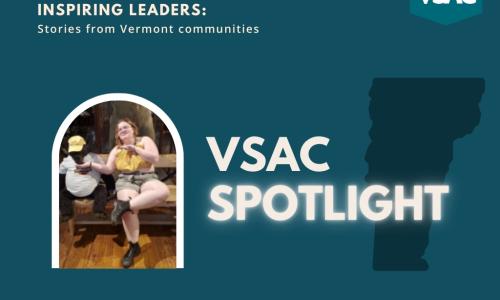Planning for college or training this year? Apply for the Vermont Grant.
March 8th College & Career Pathway Event: Free workshops for students and families

For some high school students, finding their way after graduation day can feel like preparing to step out into an abyss—even if they have a good idea what career they want to pursue. Choosing the right college or training program, gaining admission, and figuring out how to pay for it are each intimidating enough on their own, especially for first-generation or students from families with modest income. And for students who still need help translating hobbies and interests into possible career paths, that abyss can seem even scarier.
VSAC’s annual College and Career Pathways events bring together expert presenters from a variety of perspectives to offer guidance on those next steps. The events include four weekday field trip programs during March and April for students in grades 9 through 11 held at various college locations across the state, and a public event for students and families on Saturday, March 8, both virtually and in-person at the University of Vermont’s Davis Center (UVM). The events offer workshops on writing a great college essay, strategies for taking the SAT or ACT, resources for neurodiverse students, an overview of financial aid, and more.
“Engaging students in the great variety of opportunities available to them helps them find their own path, and grow into fulfilling careers,” noted Scott Giles, VSAC President and CEO. “Nearly every high-wage, high-demand job in Vermont requires education or training beyond high school. VSAC’s College & Career Pathways event provides tools, resources, and inspiration so teens can begin to envision their career and lifetime goals, and families and guardians can learn more about supporting them in their choices.”
A new workshop focuses on apprenticeships
New this year for the March 8 UVM event, a team from Vermont State University (VTSU) will present an overview of apprenticeship programs, a “work, learn and earn” path for students interested in pursuing—or simply exploring—a career in the trades.
While apprenticeships are key to success for some students, they’re also important to Vermont. According to a proclamation issued in November 2024 by Governor Scott, “the advancement and well-being of Vermont depends upon its ability to expand opportunities in its workforce that are inclusive of individuals who have been historically underserved, marginalized, and adversely affected by persistent poverty and inequality in their chosen fields.” The proclamation notes that “Vermont proudly boasts a thriving community of approximately 1,844 apprentices who contribute significantly to the state’s economy, workforce, and community development.”
Presenter Sarah Ballou, Director of Apprenticeship Programs at VTSU, says “this is a great option for those students who still need career inspiration.”
A great way to explore, in a wide variety of fields
Ballou explains that apprenticeships aren’t just for the student who has already decided on a particular trade and wants a head start. She and her team have been promoting apprenticeships more broadly, beyond those who are already enrolled at their local tech center.
“So many high school students don’t know what they want to do, so hearing about these opportunities can spark an interest. An apprenticeship is a great way for students to get information early and to try out a job they’re curious about,” she says.
Aaron Brittain of Danville, who VSAC profiled in 2023, went to automotive school after starting out as an electrician and deciding it wasn’t the best fit. Before going back to school, he worked for a year in a local automotive shop to make sure he liked auto repair. That work experience, he said, was invaluable. “I’m focused on school, and I value the investment, probably because I’ve physically worked in a shop,” he says.
The State of Vermont runs registered apprenticeship programs for electrical, plumbing, EMT, manufacturing, utility work, corrections, CNC machining, HVAC, phlebotomy, and police. More opportunities are coming online every day in all areas of the state.
The programs combine classroom instruction with on-the-job training, and they vary in length from one to six years. Students usually work full-time with their employer (though there are some part-time work options to start), then take evening classes two nights a week from November to May. Upon completion, apprentices receive a nationally recognized credential that demonstrates their expertise in their chosen field. For some licensed trades, like plumbing and electrical, an apprenticeship is required; for others, it’s a way to gain experience, confirm your interest, and improve your marketability—while earning a paycheck
“Earn as you learn”
Most starting wages for an apprentice range from $14 to $20 hourly, and wages increase as the student learns. In some apprenticeships, job-site learning is measured by hours worked, while other programs track progress by skill mastery. The goal is to get apprentices up to an average journeyman’s wage—around $25 per hour—by the time they graduate.
There is a cost involved, because the classes come with tuition, but lots of assistance is available. Ballou explains that employers participating in the state-registered programs are required to pay for students’ classes, and many other employers will offer to do so as part of their agreement. For expenses not covered by the employer, students may be eligible for a VSAC Advancement Grant and may be able to use VT529 funds for apprenticeship classes.
Opportunities for students of all ages
VTSU works with potential apprentices from age 16 to 65, and the programs’ flexibility accommodates a wide variety of schedules and circumstances. Ballou notes that there are many part-time work options that allow students to start gaining field experience while they’re still in high school. For those who want to get a head start on the classroom instruction, an apprentice can take classes for six to 12 months before being paired with an employer. “Getting a head start on classes shows employers you’re really motivated,” Ballou says.
An apprenticeship can also be a great fit for adults who are already in the workforce but want to earn additional credentials. In addition, Ballou says, there are no minimum educational requirements, so those who didn’t finish high school are welcome to apply.
Helping employers build a skilled and loyal workforce
For businesses, sponsoring apprentices provides access to a pool of motivated individuals who are eager to learn and contribute. According to Zachary Johnston, who works with Ballou at VTSU, that pool is growing. “We have 820 apprentices in our electrical and plumbing programs alone, and a total of 1,851 apprentices in all fields. The numbers have grown significantly.” Ballou adds that 2024 was their biggest incoming apprenticeship class ever, with 100 more students than the year before.
Employers don’t have to be large operations; they can be small mom-and-pop shops or even self-employed individuals. “Small businesses and sole practitioners should really consider taking on an apprentice,” says Ballou. “It means a lot to the development of the Vermont workforce.”
Register for the College and Career Pathways event
Visit College and Career Pathways For more information on the apprenticeship presentation, and to see the full list of workshops. Registration is required and the event is free and open to the public. For those who can’t attend in person, all sessions will also be live-streamed via Zoom and recorded.






